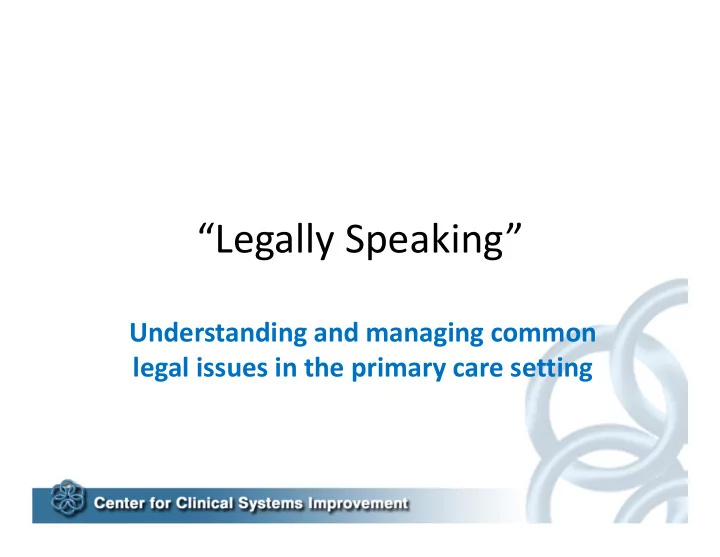

“Legally Speaking” Understanding and managing common legal issues in the primary care setting
Presenter Caroline M. Dellenbusch, J.D. Attorney Counselor Mediator
Goals and Objectives Learn and understand legal terms that often occur in the primary care setting Be able to identify the appropriate legal paperwork Discuss how to best manage selected situations when confronted with legal issues Referral information for legal help
Common Legal Terms • Advance Directives – Durable Power of Attorney for Health Care – Patient Advocate Designation – Health Care Proxy – Living Will – Do-Not-Resuscitate (DNR) – Anatomical Gifts
Common Legal Terms • Durable Power of Attorney for Finances -Agent • Revocable Living Trust -Trustee
Common Legal Terms • Guardian -A person appointed by a probate court and given power and responsibility to make certain decisions about the care of another individual.
Common Legal Terms • Conservator -A person appointed by a probate court and has broad power to handle all assets held on behalf of the protected individual and to make payments from the assets for the health, benefit, and welfare of the protected individual.
Durable Power of Attorney • A Durable Power of Attorney for Health Care (DPOA-HC) is a legal mechanism which allows an individual to appoint a person to make health care decisions when that individual becomes unable to do so .
Durable Power of Attorney • The Durable Power of Attorney for Health Care (DPOA-HC) is also known as a health care proxy or a patient advocate designation.
Durable Power of Attorney • A DPOA-HC as your appointed patient advocate, makes decisions based on your wishes and the circumstances of your medical condition at that particular time.
Advanced Directives • A DPOA-HC and a “living will” both fall under the broad category of advance directives. • A “living will”, by contrast to a DPOA-HC, is simply a written statement of your wishes which must be interpreted and implemented by someone, perhaps a family member or your physician.
Advanced Directives • “Living wills” are not legally binding in Michigan.
Advanced Directives • Two other Advanced Directives are: 1. A do-not-resuscitate declaration (DNR) 2. A declaration of anatomical gift when the individual dies.
Advanced Directives • Reference document: Feb 2014 DNR 2 no physician.pdf
Advanced Directives • Reference document: Feb 2014 DNR 1 physician.pdfx.pdf
Legal Guardian • The individual must be a legally incapacitated individual and imposition of guardianship must be necessary to provide for the individual’s care.
Legal Guardian • A legally incapacitated individual is an adult who is impaired by reason of mental illness, mental deficiency, physical illness or disability, chronic use of drugs, chronic intoxication, or other cause to the extent of lacking sufficient understanding to make or communicate decisions.
Legal Guardian • A judge makes this decision often relying on medical professionals and evaluations.
Legal Guardian • If the individual has a reduced life expectancy due to advanced illness, the guardian may have the power to make an informed decision on behalf of the individual regarding receiving, continuing, or refusing medical treatment .
Legal Guardian • Reference document: Order Appointing Guardian DD.pdf
Legal Guardian • Reference document: Order Appointing Temporary Guardian.pdf
Legal Guardian • Reference document: Letters of Guardianship DD.pdf
Legal Guardian • Reference document: Letters of Temp Guardianship.pfx.pdf
Legal Guardian • Reference document: Order Appointing Guardian of Incapacitated Individual.pdfx.pdf
Pros & Cons • Patient Advocate vs Guardian
Power of Attorney for Finances • Reference document: Durable Power of Attorney.pdf
Trust • Reference document: Certificate of trust existence and authority.pdf
Conservator • Reference document: Order Appointing Conservator.pdf
Conservator • Reference document: Letters of Conservatorship.pdf
Pros & Cons • Agent under Durable Power of Attorney for Finances vs Conservator
Case One • What do you do when a person presents himself at your office and states that he is the patient’s DPOA-HC. Do you first insist on seeing the legal documents? • Discussion
Case Two • What do you do when a patient’s family member insists on talking for the patient and that all information about the patient’s diagnosis and treatments are only shared with him? • Discussion
Case Three • What happens when conflicting paper work is presented? • Discussion
Case Four • What if there is no one to speak for the patient and the patient may not have capacity to give informed consent? • Discussion
Case Five • What is the legal standing of an advanced directive for an individual who has an assigned DPOA? • Discussion
Referral Information • Elder Law of Michigan • A non-profit organization specializing in training, education, and advocacy on legal issues facing seniors in Michigan • www.elderlawofmi.org • (866)- 400-9164
Referral Information • Michigan Legal Help • “Do-It-Yourself” tutorials and forms in areas in law where an attorney may not be necessary. • www.michiganlegalhelp.org
Referral Information • Legal Assistance Center • Solving basic legal problems without an attorney • No appointment is necessary and most services are free • (616) 632-6000 • www.legalassistancecenter.org
Referral Information • Lawyer Referral and Information Service (Kent County Legal Assistance Center) • www.lawyerreferralservices.org/kent-county- mi/
Referral Information • Legal Aid of Western Michigan • Serves people in 17 counties in the lower western part of Michigan. • Services are targeted for persons who are at or slightly over the federal poverty levels and Seniors. • www. legalaidwestmi ch.org • (800) 442-2777 or (616) 774-0672
Referral Information • DIY Will and Advance Directives: • Planning for Your Peace of Mind—A Guide to Medical and Legal Issues • Reference document: MCM_Advance Directive.pdf
Referral Information • Planning for Your Peace of Mind—A Guide to Medical and Legal Issues • Reference document: PeaceofMind.pdf
Questions? • Please ask or type your questions in chat
Thank you! • Please complete the brief survey following the presentation. This will help us understand your ongoing needs. – Other topics for webinars – Onsite practical workshops that include CEUs
Recommend
More recommend